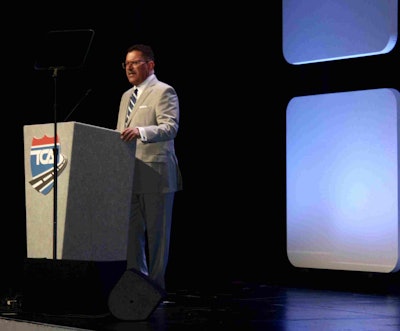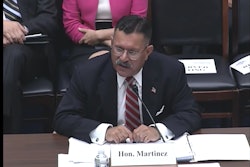 FMCSA Administrator Ray Martinez spoke to the Truckload Carriers Association members Mar. 26
FMCSA Administrator Ray Martinez spoke to the Truckload Carriers Association members Mar. 26Nearly a month into his job as FMCSA Administrator, Ray Martinez told an audience at the Truckload Carriers Association (TCA) that he looks forward to “meeting great people” and having “productive conversations.”
Martinez addressed the TCA annual convention in Kissimmee, Fla., the morning of Mar. 26. The week before, Martinez spoke to a less friendly audience at the Mid-America Truck Show about the ELD rule.
“I wish (the conversation) could be more productive rather than just anger,” he said about that previous industry meeting. “I am looking for (TCA) for help on how to move the ball forward.”
Safety will remain the top priority of the FMCSA as Martinez looks to fulfill a directive from President Trump and Secretary of Transportation Elaine Chao to ensure that government is not an impediment to efficiency.
Martinez is interested in learning how the trucking industry can use ELDs to reduce incidents of driver fatigue without negatively impacting commerce. He noted soft enforcement of the ELD rule will end on April 1, 2018, after which violations found during roadside inspections will impact carrier safety scores. He reported that the compliance rate for ELDs has been improving weekly and currently reaches 96 percent.
Martinez emphasized that the agency will not be looking to change the ELD rule but is open to the possibility of revisiting the hours-of-service rules to further increase safety and efficiency.
“I think there is some worth in looking at hours of service. I am looking forward to getting a good impact study from the industry,” he said.
He said FMCSA will soon publish final guidance on the 150 air-mile exemption for electronic logs and the use of personal conveyance. The agency will also finalize new rules for minimum driver training requirements to obtain a CDL and create a drug-and-alcohol clearinghouse. Carriers will be able to use the clearinghouse to identify driver applicants that recently have failed drug tests at previous employers.
In 2016, fatalities involving large trucks increased 5.4 percent, year over year, to reach 4713. Seventy-two percent of the fatalities were occupants of passenger vehicles. Martinez wants to “drive those numbers down,” but “I’m not sure we are going to get answers from people who work in our building. We need some answers from you.”
Looking forward, Martinez wants to embrace revolutionary changes in transportation technology.
“It is really exciting but on the government side, we have to balance enthusiasm with accepting the responsibility for ensuring that technology is deployed safely.”
Throughout his morning address, Martinez emphasized a business-friendly approach to achieving safety goals.
“If we can reach our safety goals through guidance, and not additional rule making, we will take that path. I hope to have a great relationship with your association. I am a believer in open doors and open ears, so I can do my job better through your guidance,” he said.












